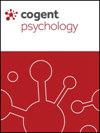对无关负面信息的抑制减轻了心理困扰在特质沉思与抑郁和焦虑症状之间的中介作用
IF 1.6
Q2 PSYCHOLOGY, MULTIDISCIPLINARY
引用次数: 0
摘要
本文章由计算机程序翻译,如有差异,请以英文原文为准。
Inhibition on irrelevant negative information alleviates the mediating role of psychological distress in the association between trait rumination and symptoms of depression and anxiety
Abstract This study aims to examine whether psychological distress mediates the association between rumination and symptoms of depression-anxiety, and whether such a mediating role is moderated by the ability to inhibit irrelevant negative information (a moderated-mediation model). On-line questionnaires comprising the Ruminative Response Scale (RRS), Depression, Anxiety, and Stress Scale (DASS-21), and Negative Affective Priming (NAP) Task as a measure of inhibitory control (IC) on negative information were administered to 181 participants (M = 21.57 years old, 80.1% females). The results of the analyses showed (1) a significant negative association between psychological distress and the performance of inhibitory control on negative information, (2) a partial mediating role of psychological distress in the relationship between rumination and symptoms of depression and anxiety, and (3) that the mediating role was moderated by inhibitory control performance. The stronger the inhibitory control, the weaker a relationship between rumination and psychological distress, which is associated with the reduction in the mediating role of psychological distress on the symptoms of depression and anxiety. The implications of our findings will be discussed by considering the systemic dynamic Model for understanding depression and anxiety.
求助全文
通过发布文献求助,成功后即可免费获取论文全文。
去求助
来源期刊

Cogent Psychology
PSYCHOLOGY, MULTIDISCIPLINARY-
CiteScore
2.90
自引率
0.00%
发文量
75
审稿时长
12 weeks
期刊介绍:
One of the largest multidisciplinary open access journals serving the psychology community, Cogent Psychology provides a home for scientifically sound peer-reviewed research. Part of Taylor & Francis / Routledge, the journal provides authors with fast peer review and publication and, through open access publishing, endeavours to help authors share their knowledge with the world. Cogent Psychology particularly encourages interdisciplinary studies and also accepts replication studies and negative results. Cogent Psychology covers a broad range of topics and welcomes submissions in all areas of psychology, ranging from social psychology to neuroscience, and everything in between. Led by Editor-in-Chief Professor Peter Walla of Webster Private University, Austria, and supported by an expert editorial team from institutions across the globe, Cogent Psychology provides our authors with comprehensive and quality peer review. Rather than accepting manuscripts based on their level of importance or impact, editors assess manuscripts objectively, accepting valid, scientific research with sound rigorous methodology. Article-level metrics let the research speak for itself.
 求助内容:
求助内容: 应助结果提醒方式:
应助结果提醒方式:


